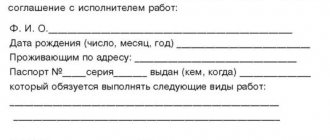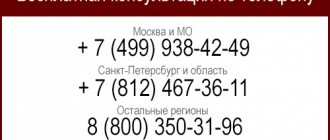What is disqualification
Disqualification of the company's chief executive is an extremely undesirable event, but quite probable given the established judicial practice on administrative offenses. This type of punishment is aimed at increasing the efficiency of administrative responsibility of managers of Russian companies (LLC, PJSC and JSC).
The main reasons for the disqualification of a manager are violations of labor laws, for example: non-payment of wages, as well as bringing the company to bankruptcy in combination with non-compensation for damage caused. In most cases, disqualification occurs if the violation is repeated.
Only a court (court decision) can disqualify a director; such a decision can be challenged in a higher court.
The issue of types of liability is discussed in the article: Responsibility of the director.
Reasons for initiating a case of an administrative offense
The question of disqualification does not arise just like that. There are several reasons for initiating a case of an administrative offense. They are listed in Part 1 of Art. 28.1 Code of Administrative Offenses of the Russian Federation.
Firstly, if officials authorized to draw up protocols have discovered data that indicates the presence of an administrative offense. For example , officials of the Federal Labor Inspectorate and state labor inspectorates subordinate to it have the right to draw up protocols for violations of labor and labor protection legislation. This is stated in paragraphs. 16 clause 2 art. 28.3 Code of Administrative Offenses of the Russian Federation.
Secondly, when materials are received from law enforcement agencies, as well as from other state bodies, local governments, and public associations, if such materials contain data that indicates the presence of an administrative offense.
The third reason for initiating a case of an administrative offense is messages and statements of individuals and legal entities, as well as messages in the media. An exception to this rule is administrative offenses provided for in Part 2 of Art. 5.27 Code of Administrative Offenses of the Russian Federation.
Disqualification of a person as a type of administrative punishment
When considering cases of challenging decisions, actions (inaction) of administrative bodies taken (allowed) by them as part of the application of measures to ensure proceedings in a case of an administrative offense (Article 27.1 of the Code of Administrative Offenses of the Russian Federation), including the seizure of things and documents (Article 27.10 of the Code of Administrative Offenses of the Russian Federation ), arrest of goods, vehicles and other things (Article 27.14 of the Code of Administrative Offenses of the Russian Federation), courts should keep in mind that independent challenge of such decisions, actions (inaction) is allowed only before an administrative body makes a decision to bring a person to administrative responsibility or before sending an administrative body of materials on the case of an administrative offense for consideration in court.
Such decisions, actions (inaction) can be challenged according to the rules provided for in Chapter 24 of the Arbitration Procedure Code of the Russian Federation.
When considering this category of cases, the court is not bound by the requirement of the administrative body to impose a specific type and amount of punishment and determines it, guided by the general rules for imposing punishment, including taking into account mitigating and aggravating circumstances. Therefore, the absence in the application for bringing to administrative responsibility an indication of the specific type and (or) amount of the punishment to be imposed is not a reason for leaving the application without progress.
Procedure and terms of disqualification
The specific procedure for disqualification and the terms for bringing an athlete to justice are not regulated by law and are established by sports federations independently.
Thus, according to Order of the Ministry of Sports of the Russian Federation dated October 2, 2012 N 267 “On approval of the All-Russian Anti-Doping Rules” (hereinafter referred to as the Rules), after an athlete is found to have prohibited substances, the results are submitted to the Disciplinary Anti-Doping Committee for consideration. The committee conducts a hearing in relation to the case, the period of which should not exceed three months from the date of notification to the athlete of his violation of the rules. If the athlete does not object that he violated the rules, no hearing may be held.
The decision of the Disciplinary Anti-Doping Committee is transmitted to the RUSADA body that manages the current activities, which sends its decision to the all-Russian sports federation for the relevant sport to apply sanctions on the basis and in pursuance of this decision.
For your information.
If, during the investigation of a violation of anti-doping rules by RUSADA, it becomes known about a possible violation of anti-doping rules by the athlete’s personnel, then RUSADA is obliged to report this fact to the federal executive body, whose competence includes the consideration of cases of administrative offenses in this area.
About the decision made by the all-Russian sports federation for the relevant sport on the basis and in pursuance of the decision of RUSADA, the all-Russian sports federation for the relevant sport informs the international sports federation for the relevant sport, RUSADA, the Ministry of Sports, and the executive authorities of the relevant constituent entities of the Russian Federation within a reasonable time.
According to the Rules, the period of disqualification in connection with an anti-doping rule violation can range from one year to life. The period of disqualification is counted from the date established by the decision of the relevant sports federation. However, it can be reduced if it turns out that the violation was committed with minor fault of the athlete or his negligence, but not more than twice the minimum term provided for this violation. If the term is lifelong, then the reduced term cannot be less than eight years.
Note.
Decisions made in accordance with the Rules may be appealed in accordance with the procedure established by them.
Disqualification of football athletes is regulated by Art. 16 of the RFU Disciplinary Regulations, according to which disqualification is imposed for matches, days or months, years. Unless otherwise stated, it may not exceed 24 matches or two years.
If a disqualification is imposed for a certain number of matches, then only the matches played by the team of the disqualified person count towards its implementation. If the match is not completed and the result of the match is annulled or if one of the teams is awarded a defeat, the disqualification is considered to be implemented. If a replay of the match is ordered, the disqualification is not considered implemented.
If a disqualification is combined with a fine, it will be extended until the fine is paid in full.
All disqualifications (including automatic ones) not implemented in the current season are carried over to the next season.
The regulations, for example, provide for disqualification for rough play, punishable by removal, for three matches, for causing serious injury to another player, resulting in permanent or temporary disability, for at least seven matches (Article 35), for fighting before, during time or after the end of the match - no less than five matches (Article 37), etc.
Procedure for disqualifying a director
Disqualification consists of depriving an individual of the right to occupy leadership positions in the executive management body of a legal entity, to join the board of directors (supervisory board), to conduct business activities to manage a legal entity, as well as to manage a legal entity in other cases provided for by the legislation of the Russian Federation.
Duration of administrative disqualification of the general director
Disqualification is established for a period of 6 (six) months to 3 (three) years.
Administrative punishment in the form of disqualification is imposed by a judge
Disqualification may not be applied to all employees, but only to persons performing organizational, administrative or administrative functions in a body of a legal entity, to members of the board of directors, as well as to persons conducting business activities without forming a legal entity, including arbitration manager.
What to consider
When terminating an employment contract on this basis, the following must be taken into account:
- A judge’s decision to apply disqualification as an administrative penalty comes into force after the expiration of the period for appealing it (entry into legal force), or after a ruling by the court of appeal or cassation to leave this decision in force. Cancellation of a decision to disqualify an employee through judicial supervision is the basis for the employee’s reinstatement at work;
- dismissal applies only to an employee holding a position specified in the disqualification order;
- dismissal is allowed only if it is impossible to transfer the employee with his consent to another job.
For reference: How to change the director.
§ 4. Disqualification of the head of the organization
For some of the violations committed, an official of the organization (often a manager) may incur administrative punishment in the form of disqualification.In accordance with Art. 3.11 of the Code of Administrative Offenses of the Russian Federation, disqualification consists of depriving an individual of the right to hold positions in the executive body of a legal entity, to join the board of directors (supervisory board), to carry out entrepreneurial activities to manage a legal entity, to manage a legal entity in other cases provided for by the legislation of the Russian Federation, to fill positions federal state civil service, positions of state civil service of a constituent entity of the Russian Federation, positions of municipal service, carry out activities in the provision of state and municipal services or activities in the field of training athletes (including their medical support) and organizing and holding sporting events or carry out activities in the field of industrial examination security, carry out medical activities or pharmaceutical activities.
An administrative penalty in the form of disqualification is imposed by a judge.
A disqualified person is deprived of the right to engage not in full entrepreneurial activity, but in a certain type of it. The established ban applies to special types of activities that require professional skills that require qualifications and allow making decisions or performing specific actions, the specifics of which are established by law.
This is due to the fact that a person who, by virtue of the law or the constituent documents of a legal entity, acts on its behalf must act in the interests of the legal entity he represents in good faith and reasonably.
For administrative offenses entailing disqualification, administrative liability may be brought no later than one year from the date of commission of the offense, and in the case of a continuing administrative offense - one year from the date of its discovery (Part 3 of Article 4.5 of the Code of Administrative Offenses of the Russian Federation).
In areas controlled by tax authorities, disqualification is provided for:
— failure to comply within the prescribed period with a legal decision, resolution of the tax authority (official) to eliminate violations of the law (Part 1 of Article 19.5 of the Code of Administrative Offenses of the Russian Federation);
— submission to the body carrying out state registration of legal entities of documents containing knowingly false information, if such an action does not contain a criminal offense (Part 4 of Article 14.25 of the Code of Administrative Offenses of the Russian Federation).
Disqualification as a sanction for violating state registration legislation is an alternative to a fine of 5 thousand rubles.
The declarative procedure for state registration of legal entities is characterized not only by an exhaustive list of formal grounds for refusal of state registration, but also by the possibility of subsequently bringing legal entities that provided false information for inclusion in the state register to liability under the legislation of the Russian Federation.
Let us note that for failure to submit or untimely submission or submission of false information about a legal entity or an individual entrepreneur to the tax authority that carries out state registration of legal entities and individual entrepreneurs, a warning or a fine in the amount of 5 thousand rubles is provided. (Part 3 of Article 14.25 of the Code of Administrative Offenses of the Russian Federation), but disqualification of the culprit is not expected.
Unreliable information means the presence of inaccuracies and distortions in the content of documents submitted for state registration.
The submission of false information to the registration (tax) authority is characterized by the absence of the person’s intent in providing false information, which leads to a lower administrative penalty compared to the sanction for the offense provided for in Part 4 of Art. 14.25 Code of Administrative Offenses of the Russian Federation.
It should be noted that Art. 170.1 of the Criminal Code of the Russian Federation also provides for the submission of documents containing knowingly false information to the body that carries out state registration of legal entities and individual entrepreneurs.
At the same time, this criminal act should be distinguished from the administrative offense provided for in Part 4 of Art. 14.25 Code of Administrative Offenses of the Russian Federation. Criminal liability arises only in the event of receiving a large amount of income or causing major damage.
In accordance with Part 4 of Art. 14.25 of the Code of Administrative Offenses of the Russian Federation, liability for submitting to the body carrying out state registration of legal entities documents containing knowingly false information, if such an action does not contain a criminal offense, provides for the imposition of an administrative fine on officials in the amount of 5 thousand rubles. or disqualification for up to three years.
Upon submission to the body that carries out state registration of legal entities and individual entrepreneurs, documents containing knowingly false information , in accordance with paragraph 3 of the Resolution of the Plenum of the Supreme Court of the Russian Federation dated November 18, 2004 N 23 “On judicial practice in cases of illegal entrepreneurship and legalization ( laundering) of funds or other property acquired by criminal means” should be understood as the submission of documents containing such deliberately false or distorted information, which entailed the unreasonable registration of a business entity.
The term “knowingly false” means an individual’s unambiguous awareness of the falsity and unreliability of the information submitted by him to the registration authority.
From the subjective side, the offense provided for in Part 4 of Art. 14.25 of the Code of Administrative Offenses of the Russian Federation, is characterized by guilt in the form of intent. The person knows and is aware of the illegal nature of the actions and at the same time provides deliberately false information.
Submission of knowingly false information to the registration authority is possible, for example, when submitting information about the founders of a legal entity, the authorized capital of the company (detection of facts of non-payment of the authorized capital), the address of the location of the legal entity (the actual absence of a street, house or legal entity at the location specified in application), about the passport data of an individual.
An official of the registering authority (tax inspectorate) upon discovery of data on the commission of an administrative offense, including on the basis established by Part 4 of Art. 14.25 of the Code of Administrative Offenses of the Russian Federation, immediately after an offense has been committed, a protocol on an administrative offense must be drawn up.
For committing an offense under Part 4 of Art. 14.25 of the Code of Administrative Offenses of the Russian Federation, an official of a legal entity is held administratively liable.
Within the meaning of Art. 2.4 of the Code of Administrative Offenses of the Russian Federation, the status of an official applies to individuals vested with organizational, administrative or administrative and economic functions in a legal entity, regardless of the form of ownership and subordination, as well as to individual entrepreneurs.
The protocol on an administrative offense is the main procedural document on the basis of which a decision is made in a case of administrative offenses. This document records basic information reflecting the essence of the offense committed, the data of the person against whom a case of administrative offense has been initiated. The protocol on an administrative offense must be drawn up in accordance with Art. 28.2 of the Code of Administrative Offenses of the Russian Federation, in particular, must be signed by an official of the legal entity against whom a case of an administrative offense has been initiated.
Cases of administrative offenses provided for in Part 4 of Art. 14.25 of the Code of Administrative Offenses of the Russian Federation, are considered by judges (Part 1 of Article 23.1 of the Code of Administrative Offenses of the Russian Federation).
In accordance with Part 1 of Art. 28.8 of the Code of Administrative Offenses of the Russian Federation, a protocol on an administrative offense is sent to the judge within three days from the moment of its preparation.
Based on the results of the consideration of the case of an administrative offense by the judge in accordance with Part 1 of Art. 29.9 of the Code of Administrative Offenses of the Russian Federation, a decision may be made to impose an administrative penalty or to terminate proceedings in a case of an administrative offense.
According to Part 2 of Art. 31.2 Code of Administrative Offenses of the Russian Federation and Part 1 of Art. 318 of the Arbitration Procedure Code of the Russian Federation, the resolution (decision) on disqualification is subject to execution from the moment it enters into legal force.
In accordance with Art. 32.11 of the Code of Administrative Offenses of the Russian Federation, the disqualification resolution must be executed immediately after the resolution enters into legal force by the person brought to administrative responsibility. The disqualification order is executed by terminating the agreement (contract) with the disqualified person.
Disqualification is one of the lasting administrative penalties and is established for a period of six months to three years (Part 2 of Article 3.11 of the Code of Administrative Offenses of the Russian Federation).
An employee (including a manager) who has been disqualified must be dismissed (part 2 of article 32.11 of the Code of Administrative Offenses of the Russian Federation, clause 8 of part 1 of article 83, 84 of the Labor Code of the Russian Federation). As defined in Art. 83 of the Labor Code of the Russian Federation, termination of an employment contract is allowed if it is impossible to transfer the employee with his written consent to another job available to the employer (both a vacant position or work corresponding to the employee’s qualifications, and a vacant lower position or lower paid work), which the employee can perform, taking into account his state of health. In this case, the employer is obliged to offer the employee all vacancies available in the given area that meet the specified requirements. The employer is obliged to offer vacancies in other localities if this is provided for by the collective agreement, agreements, or employment contract.
The Federal Tax Service of Russia keeps records of disqualified persons in a special register.
The violator is removed from the register only upon expiration of the period of disqualification.
Please note : when hiring a citizen for the position of manager or specialist, the employer is obliged to check whether the applicant is disqualified (Article 32.11 of the Code of Administrative Offenses of the Russian Federation).
Interested persons can receive, for a fee, the information contained in the register of disqualified persons, in the form of an extract about a specific disqualified person or a certificate of absence of the requested information. The provision of an extract (certificate) is carried out in the Procedure established by Order of the Federal Tax Service of Russia dated March 6, 2012 N ММВ-7-6/ [email protected] “On approval of the Procedure for providing information from the register of disqualified persons and the form of an extract from the register of disqualified persons.”
It should also be remembered that for a disqualified person carrying out activities related to managing a legal entity during the period of disqualification, a fine of 5 thousand rubles is provided. from himself, and for concluding an agreement with such a manager for the management of a legal entity, as well as non-application of the consequences of termination of its validity, a fine of up to 100 thousand rubles is imposed on the legal entity. (Article 14.23 of the Code of Administrative Offenses of the Russian Federation).
Above, we indicated the grounds on which a director may be subject to disqualification at the initiative of the tax service itself, however, disqualification as a type of administrative penalty is also provided for many other violations.
As the tax service receives copies of relevant decisions from the courts, it creates a register of persons disqualified for committing, in particular, the following administrative offenses:
— violation of labor legislation and other regulatory legal acts containing labor law norms on labor and labor protection by a person previously subjected to administrative punishment for a similar offense (Parts 4, 5 of Article 5.27 of the Code of Administrative Offenses of the Russian Federation);
— illegal actions to obtain and (or) disseminate information constituting a credit history, if such actions do not contain a criminal offense (Article 5.53 of the Code of Administrative Offenses of the Russian Federation);
— violation of legal requirements on the disclosure of information by organizations operating in the field of management of apartment buildings (Part 2 of Article 7.23.1 of the Code of Administrative Offenses of the Russian Federation);
— violation of legal requirements for the transfer of technical documentation for an apartment building and other documents related to the management of such an apartment building (Part 2 of Article 7.23.2 of the Code of Administrative Offenses of the Russian Federation);
- procurement of goods, works, services in the event that such procurement, in accordance with the legislation of the Russian Federation in the field of procurement of goods, works, services by certain types of legal entities, must be carried out in electronic form, in another form by a person previously subjected to administrative punishment for a similar administrative offense more than two times (part 2 of article 7.32.3 of the Code of Administrative Offenses of the Russian Federation);
— violation of industrial safety requirements or conditions of licenses for carrying out activities in the field of industrial safety of hazardous production facilities (Article 9.1 of the Code of Administrative Offenses of the Russian Federation);
— violation of fuel reserve standards, the procedure for the creation and use of fuel reserves by thermal power plants (Article 9.17 of the Code of Administrative Offenses of the Russian Federation);
— violation of the procedure for bringing electric power facilities out for repairs, resulting in a complete and (or) partial restriction of the mode of consumption of electrical and (or) thermal energy by consumers for more than three calendar days (Article 9.18 of the Code of Administrative Offenses of the Russian Federation);
— violation of the procedure for posting information in the state information system of housing and communal services by an official who was previously subjected to administrative punishment for a similar administrative offense (Part 4 of Article 13.19.1 of the Code of Administrative Offenses of the Russian Federation);
— sale of goods, performance of work or provision of services to the population of inadequate quality or in violation of the requirements established by the legislation of the Russian Federation (Part 2 of Article 14.4 of the Code of Administrative Offenses of the Russian Federation);
— overstatement (understatement) of state-regulated prices (tariffs, rates, rates, etc.) for products, goods or services (Parts 1, 2 of Article 14.6 of the Code of Administrative Offenses of the Russian Federation);
— fictitious bankruptcy (part 1 of article 14.12 of the Code of Administrative Offenses of the Russian Federation);
— deliberate bankruptcy (part 2 of article 14.12 of the Code of Administrative Offenses of the Russian Federation);
- concealment of property or property obligations, information about property, its size, location or other information about property, as well as concealment, destruction, falsification of accounting and other accounting documents, if these actions were committed during bankruptcy or in anticipation of bankruptcy (Part 1 of Art. 14.13 Code of Administrative Offenses of the Russian Federation);
- unlawful satisfaction of property claims of individual creditors at the expense of the property of a debtor - a legal entity, obviously to the detriment of other creditors, as well as the acceptance of such satisfaction by creditors who are aware of the preference given to them to the detriment of other creditors, if these actions were committed in the presence of signs of bankruptcy and do not contain criminal penalties acts (part 2 of article 14.13 of the Code of Administrative Offenses of the Russian Federation);
— failure to fulfill the obligations established by the legislation on insolvency (bankruptcy), if such action (inaction) does not contain a criminal offense (Part 3 of Article 14.13 of the Code of Administrative Offenses of the Russian Federation);
— illegal obstruction of the activities of an arbitration manager or temporary administration of a credit or other financial organization (Part 4 of Article 14.13 of the Code of Administrative Offenses of the Russian Federation);
— failure of the head of a legal entity or an individual entrepreneur to fulfill the obligation to file an application for declaring bankruptcy to the arbitration court in cases provided for by the legislation on insolvency (bankruptcy) (Part 5 of Article 14.13 of the Code of Administrative Offenses of the Russian Federation);
— violation by the trade organizer of the procedure for disclosing information established by the legislation on organized trades (Part 3 of Article 14.24 of the Code of Administrative Offenses of the Russian Federation);
— obstruction by the trade organizer of inspections by the Bank of Russia or evasion of such inspections (part 4 of article 14.24 of the Code of Administrative Offenses of the Russian Federation);
— violation of restrictions on combining activities of conducting organized trading with other types of activities (Part 5 of Article 14.24 of the Code of Administrative Offenses of the Russian Federation);
— illegal actions to obtain or provide a credit report or information constituting a credit history and included in a credit report, if such actions do not contain a criminal offense (Article 14.29 of the Code of Administrative Offenses of the Russian Federation);
— abuse of a dominant position in the product market (Part 2 of Article 14.31 of the Code of Administrative Offenses of the Russian Federation);
— conclusion of an agreement limiting competition, implementation of concerted actions limiting competition, coordination of economic activities (parts 1 and 2 of Article 14.32 of the Code of Administrative Offenses of the Russian Federation);
— failure to submit or untimely submission of documents on a dispute related to the creation of a legal entity, its management or participation in it (Article 14.36 of the Code of Administrative Offenses of the Russian Federation);
— violation of the rules for performing certification work or issuing a certificate of conformity in violation of legal requirements (Parts 1 - 3 of Article 14.47 of the Code of Administrative Offenses of the Russian Federation);
— presentation by a testing laboratory (center) for the purpose of assessing (confirming) compliance of unreliable or biased results of research (tests) and (or) product measurements (Article 14.48 of the Code of Administrative Offenses of the Russian Federation);
- gross violation of the terms of a state contract for a state defense order or the terms of an agreement concluded for the purpose of fulfilling a state defense order (Part 3 of Article 14.55 of the Code of Administrative Offenses of the Russian Federation);
— misuse of budget funds, if such an action does not contain a criminal offense (Article 15.14 of the Code of Administrative Offenses of the Russian Federation);
— violation of legal requirements regarding the presentation and disclosure of information on financial markets, if these actions (inaction) do not contain a criminal offense (Parts 1 and 2 of Article 15.19 of the Code of Administrative Offenses of the Russian Federation);
— unlawful use of insider information, if this action does not contain a criminal offense (Article 15.21 of the Code of Administrative Offenses of the Russian Federation);
— violation of the rules for maintaining the register of securities owners (Parts 1, 2 of Article 15.22 of the Code of Administrative Offenses of the Russian Federation);
— violation of the requirements of the law on the procedure for preparing and holding general meetings of shareholders, participants in limited (additional) liability companies and owners of investment shares of closed mutual investment funds (Part 1 - 10 of Article 15.23.1 of the Code of Administrative Offenses of the Russian Federation);
- illegal issuance or circulation of documents certifying monetary and other obligations and not being securities, if these actions do not contain a criminal offense (Article 15.24.1 of the Code of Administrative Offenses of the Russian Federation);
— failure of an organization carrying out transactions with funds or other property to comply with the requirements of the legislation on combating the legalization (laundering) of proceeds from crime and the financing of terrorism, if these actions (inaction) do not contain a criminal offense (Parts 3, 4 of Art. 15.27 Code of Administrative Offenses of the Russian Federation);
— violation of the requirements of the legislation of the Russian Federation concerning the activities of professional participants in the securities market, clearing organizations, persons performing the functions of a central counterparty, joint-stock investment funds, non-state pension funds, management companies of joint-stock investment funds, mutual funds or non-state pension funds, specialized depositories of joint-stock investment funds funds, mutual investment funds or non-state pension funds (parts 1 - 7, 9, 10, 10.2, 11 of article 15.29 of the Code of Administrative Offenses of the Russian Federation);
— market manipulation, if this action does not contain a criminal offense (Article 15.30 of the Code of Administrative Offenses of the Russian Federation);
— violation of the requirements of the law on combating the unlawful use of insider information and market manipulation (Part 1, 4, Article 15.35 of the Code of Administrative Offenses of the Russian Federation);
— gross violation by the head contractor or the contractor of the state defense order of the rules for maintaining separate records of the results of financial and economic activities (Article 15.37 of the Code of Administrative Offenses of the Russian Federation);
— failure to comply within the prescribed period with a legal order (resolution, presentation, decision) of the body (official) exercising state supervision (control), municipal control, to eliminate violations of the law (Part 1 of Article 19.5 of the Code of Administrative Offenses of the Russian Federation);
— failure to comply within the prescribed period with a legal order, decision of the body authorized in the field of export control, its territorial body (Part 2 of Article 19.5 of the Code of Administrative Offenses of the Russian Federation);
- failure to comply within the prescribed period with a legal decision, order of the federal antimonopoly body, its territorial body (parts 2.1 - 2.3, 2.6, 2.7 of Article 19.5 of the Code of Administrative Offenses of the Russian Federation);
— failure to comply within the prescribed period with a legal order, decision of the body regulating natural monopolies, its territorial body (Part 3 of Article 19.5 of the Code of Administrative Offenses of the Russian Federation);
— failure to comply within the prescribed period with a legal order or decision of the body authorized in the field of state regulation of tariffs (Part 5 of Article 19.5 of the Code of Administrative Offenses of the Russian Federation);
— failure to comply within the prescribed period or improper fulfillment of a legal order of the federal executive body exercising state control and supervision in the field of safe conduct of work related to the use of subsoil, industrial safety and the safety of hydraulic structures (Part 11 of Article 19.5 of the Code of Administrative Offenses of the Russian Federation);
— failure to comply within the prescribed period with a legal order of the body exercising state fire supervision at protection facilities where activities in the field of healthcare, education and social services are carried out (Parts 13, 14 of Article 19.5 of the Code of Administrative Offenses of the Russian Federation);
— failure to comply within the prescribed period with a legal order of the federal executive body exercising functions of control and supervision in the field of safety in the use of atomic energy (Part 17 of Article 19.5 of the Code of Administrative Offenses of the Russian Federation);
— failure to comply within the prescribed period with a legal order of the body authorized to exercise state control in the field of preservation, use, popularization and state protection of cultural heritage objects (Parts 18, 19 of Article 19.5 of the Code of Administrative Offenses of the Russian Federation);
— failure to comply within the prescribed period with a legal order of the state financial control body (Part 20, Article 19.5 of the Code of Administrative Offenses of the Russian Federation);
— failure to comply with the decision of the collegial body coordinating and organizing activities to combat terrorism (Article 19.5.1 of the Code of Administrative Offenses of the Russian Federation);
— failure to provide information or submission of knowingly false information to the body authorized in the field of state regulation of tariffs (Part 3 of Article 19.7.1 of the Code of Administrative Offenses of the Russian Federation);
— failure to provide information to the Bank of Russia in cases provided for by law, if these actions (inaction) do not contain a criminal offense (Article 19.7.3 of the Code of Administrative Offenses of the Russian Federation);
— failure to provide information or provision of knowingly false information about their activities by subjects of natural monopolies and (or) organizations of the public utility complex (Part 2 of Article 19.8.1 of the Code of Administrative Offenses of the Russian Federation);
— violation of the rules of production, sale, transfer, storage, transportation, display or accounting of weapons and ammunition for them (parts 2, 3, 6 of article 20.8, article 20.10 of the Code of Administrative Offenses of the Russian Federation);
— violation of the requirements for ensuring the safety and anti-terrorism protection of fuel and energy complex facilities (Article 20.30 of the Code of Administrative Offenses of the Russian Federation).
For all these offenses, a penalty may be imposed in the form of disqualification for various periods; information about the fact of disqualification and its reasons can be obtained from the register maintained by the tax service, which receives copies of relevant court decisions that have entered into force.
A publicly accessible register of disqualified persons is posted on the Internet portal of the Federal Tax Service of Russia https://service.nalog.ru/disqualified.do.
In addition, the Federal Tax Service of Russia makes it possible to check whether disqualified persons are included in the executive bodies of any legal entity you are interested in (https://service.nalog.ru/disfind.do).
Considering that problematic counterparties can often cause not only business losses, but also attract the close attention of the tax authorities to the organization, we recommend several more Internet services that allow you to check the counterparty and its manager for integrity:
— https://egrul.nalog.ru — Unified State Register of Legal Entities (you can find out whether a legal entity is registered or excluded from the register);
— https://service.nalog.ru/uwsfind.do — information about legal entities and individual entrepreneurs in respect of which documents for state registration have been submitted;
- https://www.vestnik-gosreg.ru/publ/vgr - messages from legal entities published in the journal "Bulletin of State Registration" on decisions on liquidation, reorganization, reduction of authorized capital, acquisition by a limited liability company 20% of the authorized capital of another company, as well as other messages of legal entities that must be published in accordance with the legislation of the Russian Federation;
— https://www.vestnik-gosreg.ru/publ/fz83 — information published in the journal “Bulletin of State Registration” about decisions taken by registration authorities on the upcoming exclusion of inactive legal entities from the Unified State Register of Legal Entities;
— https://service.nalog.ru/addrfind.do — register of mass registration addresses (addresses specified during state registration as the location of several companies). If the counterparty has such an address, this is often a sign of a so-called fly-by-night company;
— https://service.nalog.ru/svl.do — information about persons in respect of whom the fact of impossibility of participation (execution of management) in the organization has been established (confirmed) in court;
— https://service.nalog.ru/baddr.do — information about legal entities with which there is no connection at the address (location) indicated by them, entered in the Unified State Register of Legal Entities;
— https://service.nalog.ru/zd.do — information about legal entities that have tax arrears and (or) have not submitted tax reports for more than a year;
— https://fssprus.ru/iss/ip — database of enforcement proceedings of the FSSP of Russia;
— https://rnp.fas.gov.ru — register of unscrupulous suppliers (contractors);
— https://services.fms.gov.ru/info-service.htm?sid=2000 — check against the list of invalid (lost (stolen) passports of a citizen of the Russian Federation issued on lost (stolen) forms, issued in violation of the established procedure, as well as invalidated) passports of citizens of the Russian Federation;
— https://kad.arbitr.ru — database of court cases of arbitration courts of the Russian Federation.
Content
Consequences of disqualification of a director and what to do
From the moment the court decision on disqualification comes into force, the head of the organization is obliged to immediately stop managing the organization. Also, a similar obligation arises for the employer (founders) on the basis of Art. 3.2 Code of Administrative Offenses of the Russian Federation.
The court decision comes into force
- (if) it has not been appealed - after 10 (ten) days from the day the director receives a copy of the resolution;
- (if) appealed - on the day the district court made a decision on the complaint.
Responsibility for non-dismissal from office
If the director, despite the disqualification, continues to lead the organization and this becomes known, in particular, to the police or the prosecutor (for example, during a prosecutor’s audit), then the court may fine
- director for 5,000 rubles,
- and an organization in the amount of up to 100,000 rubles.
According to Part 2 of Article 32.11 of the Code of Administrative Offenses of the Russian Federation, the execution of the disqualification resolution is carried out by terminating the agreement (contract) with the disqualified person.
Signing contracts is not possible
Agreements concluded and signed by a disqualified director are transactions concluded by a person without authority, and the agreement is recognized as not concluded.
Attention!
- Nothing prevents a disqualified director from acting in the interests of society (for example, representing it in government bodies) under a power of attorney issued by the new head of the company.
- If a director is disqualified in one company, then this affects other organizations where he is a director.
If the director continues to hold office
If the general director continues to exercise his powers after disqualification, then:
- the company faces a fine of up to 100 thousand rubles,
- the director will be fined - up to 5 thousand rubles. (Article 14.23 of the Administrative Code). The same liability will arise if the disqualified director gets a job in another company.
A special entry is made in the work book of a disqualified director:
“Dismissed due to disqualification (administrative punishment), which precludes the possibility of fulfilling duties under the employment contract, clause 8, part 1, art. 83 Labor Code of the Russian Federation."
Sports disqualification
The concept of sports disqualification of an athlete is disclosed in Art. 2 of the Federal Law of December 4, 2007 N 329-F3 “On Physical Culture and Sports in the Russian Federation” (hereinafter referred to as Law N 329-F3). This is the removal of an athlete from participation in sports competitions, which is carried out by an international sports federation for the relevant sport or an all-Russian sports federation for the relevant sport for violating the rules of the sport, or the provisions (regulations) of sports competitions, or anti-doping rules, or norms approved by international sports organizations, or norms approved by all-Russian sports federations.
If an athlete is disqualified, he may be dismissed, but not under clause 8, part 1, art. 83, and according to Art. 348.11 of the Labor Code of the Russian Federation, which provides additional grounds for termination of an employment contract with an athlete:
- sports disqualification for a period of six months or more;
— violation by an athlete, including a single violation, of all-Russian anti-doping rules and (or) anti-doping rules approved by international anti-doping organizations, recognized as a violation by decision of the relevant anti-doping organization.
So, let's draw conclusions:
1. Sports disqualification consists of removing an athlete from participation in competitions.
2. The international or all-Russian sports federation for the relevant sport has the right to disqualify an athlete.
3. The basis for disqualification of an athlete is a violation of:
— rules of the sport or regulations (regulations) of sports competitions;
— anti-doping standards;
— norms approved by international or all-Russian sports organizations.
4. If an athlete has violated anti-doping rules and is disqualified for less than six months, he may be dismissed under paragraph 2 of Art. 348.11 Labor Code of the Russian Federation. If the athlete was disqualified for a period of six months or more, the basis for dismissal will be clause 1 of Art. 348.11.
5. Since, by virtue of Art. 192 of the Labor Code of the Russian Federation, dismissal of an athlete on the grounds established by Art. 348.11 of the Labor Code of the Russian Federation, refers to disciplinary sanctions; upon dismissal, the procedure established by Art. 193 Labor Code of the Russian Federation.
Let's figure it out in order.
Practice and features of disqualification for tax offenses
The main part of the violations within which disqualification was applied were:
- Providing knowingly false information, incl. when registering legal entities, this is the most common reason for the disqualification of a director (Part 5 of Article 14.25 of the Administrative Code). Here the tax authorities check whether the company is located at the declared address. If it is not at the address, then the inspectors will ask for reliable information or go to court. Judges usually rule on disqualification of the CEO for a period of 1 to 3 years. Three years is the maximum period of disqualification for a director. Tips a. Request and check documents that confirm the rights to the premises from the owner or tenant; b. rent a room where company employees (at least a secretary) will actually work; V. check the selected address for mass registration on the online resource of the Federal Tax Service (https://service.nalog.ru/addrfind.do). d. provide evidence of the reality of your address if the tax authorities have already gone to court (documents, photographs, notary inspection report, witness statements).
- Lack of movements on accounts If during the year there were no reports to the tax authorities and no transactions were carried out on the accounts, the company is declared inactive and excluded from the Unified State Register of Legal Entities. If the company at the time of exclusion had a debt to the budget, then the director will not be able to register as a director in other companies for the next 3 years. Such liability cannot be called disqualification, but it has the same consequences. And this measure is applied to the director without trial. Tips a. Periodically check the mail that arrives at the company's legal address, even if it does not work. There you may receive a letter from the tax authorities requesting reliable information about the company or demanding repayment of the debt. b. Submit zero returns to the tax office to confirm the company's activities. In this case, there will be nothing except a fine for late declaration. V. Make sure that the debt is repaid and the documents are accepted by the inspectorate and no additional information is required. d. Check the data in the taxpayer’s personal account on the official website. d. Make sure that the new director has entered information about the change of director into the register of disqualified persons by receiving a free extract from the Unified State Register of Legal Entities for the company through the online service (https://egrul.nalog.ru). In case of problems, responsibility will fall on the director listed in the register.
- Repeated violation of labor laws, incl. workers' rights. Another common reason for the disqualification of a director is repeated violation of labor laws (clause 2 of article 5.27 of the Administrative Code). For example, the company violates the procedure for maintaining work records and incorrectly draws up the vacation schedule. — if the violation is detected for the first time, then the director will only be fined (Clause 1 of Article 5.27 of the Administrative Code); — if the same violation is discovered again, the director will be disqualified for 1–3 years. The court will disqualify a director only for similar violations. But it does not matter whether the director committed the same violations in the same company or in different organizations. Tips a. Challenge the first decision, even if it was a small fine for violating labor standards, if you are brought to administrative responsibility. The second violation threatens with disqualification. b. Challenge the decision already made by the court to disqualify the director, citing the absence of similar violations.
- Working without a cash register If a company does not use a cash register and this is a repeated violation, the court will disqualify the director for up to 2 years. Provided that the amount of settlements without cash register was 1 million rubles. and more (Part 3 of Article 14.5 of the Administrative Code). For the first violation, the company will only be fined (Part 2 of Article 14.5 of the Administrative Code). Tips a. Always challenge the first and repeated fines for non-use of cash registers. You will never be disqualified for a first offense, so the absence of fines will protect you. b. The disqualification itself can also be challenged. To appeal such a decision, also refer to the fact that the amount of settlements without the use of cash register was less than 1 million rubles.
- Violations in bankruptcy,
- Violations of information disclosure procedures.
In 85% of 100%, the disqualification sanction was applied to the head of the organization (director, general director, manager, etc.), which suggests that disqualification is a measure of influence on managers working in the economic sphere.
Grounds for disqualification
The list of violations for which you can be disqualified is given in the table on p. 133.
Table
| Reason for disqualification | Base |
| Violation of labor and labor protection legislation by a person previously subjected to administrative punishment for a similar administrative offense | Part 2 Art. 5.27 Code of Administrative Offenses of the Russian Federation |
| Illegal actions to obtain and (or) distribute information constituting a credit history | Article 5.53 of the Code of Administrative Offenses of the Russian Federation |
| Fictitious or deliberate bankruptcy. We are talking about a deliberately false declaration of insolvency by the head of an organization, including his appeal to the Supreme Arbitration Court of the Russian Federation with an application to be declared bankrupt if he has the opportunity to satisfy the creditors' claims in full. Punishment is also provided for deliberately creating or increasing insolvency | Article 14.12 of the Code of Administrative Offenses of the Russian Federation |
| Illegal actions in bankruptcy. Various elements of the offense are provided, for example, concealment of property or property obligations, failure to fulfill the obligation to file an application for declaring a legal entity bankrupt in an arbitration court, etc. | Article 14.13 of the Code of Administrative Offenses of the Russian Federation |
| Submission to the body carrying out state registration of legal entities of documents containing knowingly false information | Part 4 art. 14.25 Code of Administrative Offenses of the Russian Federation |
| Concluding an agreement restricting competition or carrying out concerted actions restricting competition | Article 14.32 of the Code of Administrative Offenses of the Russian Federation |
| Unfair competition, expressed in the introduction into circulation of goods with the illegal use of the results of intellectual activity and equivalent means of individualization of a legal entity, means of individualization of products, works, services | Article 14.33 of the Code of Administrative Offenses of the Russian Federation |
| Failure to comply on time with a legal order (resolution, presentation, decision) of the body (official) exercising state supervision | Article 19.5 of the Code of Administrative Offenses of the Russian Federation |
| Illegal acts of obtaining or presenting a credit report or information constituting a credit history and included in a credit report | Article 14.29 of the Code of Administrative Offenses of the Russian Federation |
Let us consider in detail Art. 5.27 of the Code of Administrative Offenses of the Russian Federation, which establishes liability for violations of labor and labor protection legislation.
What is considered a similar violation for which one can be disqualified? The Code of Administrative Offenses of the Russian Federation does not disclose this concept. For example , representatives of the labor inspectorate may consider similar violations such as non-payment of sick leave and lack of an employment contract with a part-time worker.
However, judges do not support controllers. This is evidenced by the Resolution of the Supreme Court of the Russian Federation dated February 28, 2006 N 59-ad06-1. The judges referred to paragraph 17 of the Resolution of the Plenum of the Supreme Court of the Russian Federation dated March 24, 2005 N 5. It states that a similar offense (in Part 2 of Article 5.27 of the Code of Administrative Offenses of the Russian Federation) should be understood as the commission by an official of the same, and not any violation of the law about labor and labor protection. For example , the first time an official did not make a payment when dismissing one employee, and later - when dismissing another employee.
How to check if a future director is disqualified?
Article 32.11 of the Code of Administrative Offenses established the obligation for the employer to request information about the presence of disqualification of an individual applying for activities to manage the organization. However, violation of this obligation in itself does not promise any liability for the company; administrative liability will arise only if a disqualified person is hired for the specified position. But more on that below.
An organization, before appointing a general director, forming an executive management body, electing a member of the board of directors (supervisory board), or appointing a manager, must request information about disqualification in relation to these persons.
Since January 1, 2012, the Federal Tax Service of Russia has been maintaining the Register of Disqualified Persons.
The Federal Tax Service maintains a register of disqualified persons (https://www.nalog.ru/rn77/related_activities/registries/disqualified_persons/). When making a corresponding request, an extract is issued indicating the disqualified person or the absence of such information in the register.
and
A request in the form approved by order of the Federal Tax Service is submitted to any territorial tax authority, regardless of the address of the location (place of residence) of the interested person or the person about whom information is requested. The request can be submitted directly to the Federal Tax Service, by mail or through the websites of the Federal Tax Service or State Services. But to submit via the Internet, the request must be certified with an enhanced qualified electronic signature of the person sending the request.
The deadline for providing information contained in the Register is 5 days from the date of receipt of the relevant request.
If the Register contains information about the citizen in respect of whom the request has been submitted, then an extract from the Register is issued; if not, a certificate is issued.
Citizens of the Russian Federation, foreign citizens and stateless persons are provided with information regarding themselves free of charge. For all others (except for state authorities and local self-government) - for a fee of 100 rubles.
LLC liability for directors
The organization is found guilty even if the disqualification of the applicant was not known. The company is obliged to independently verify information about the director when entering into a contract (Part 2 of Article 32.11 of the Administrative Code).
What information is stored in the registry
The register consists of judges' decisions on the disqualification of officials received from courts of general jurisdiction and arbitration courts. The information contained in the register is public.
The register contains the following information about the disqualified person:
- last name, first name, patronymic, year and place of birth, place of residence;
- in what organization and in what position the specified person worked at the time the offense was committed;
- date of commission of the offense, its essence and qualifications (indicate the article of the Code of Administrative Offenses of the Russian Federation);
- period of disqualification;
- start and expiration dates of the period of ineligibility.
After entering information about a disqualified person into the register, within ten days, the Ministry of Internal Affairs sends information about him to those federal executive authorities whose officials, in accordance with the Code of Administrative Offenses of the Russian Federation, are authorized to draw up protocols on administrative offenses. In particular, to the Federal Labor Inspectorate, internal affairs bodies (police), and the Federal Tax Service.
The deadline for providing information contained in the register is five days from the date of receipt of the relevant request.









